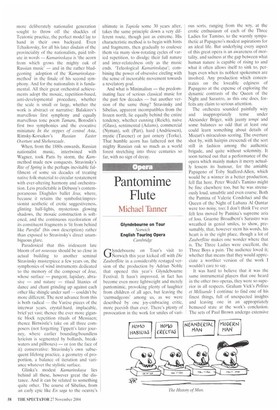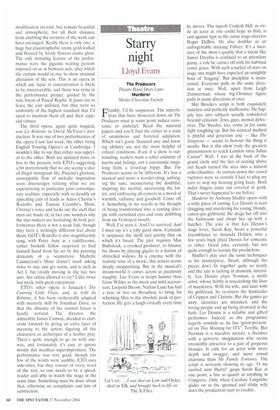Opera
Pantomime Flute
Michael Tanner
Glyndebourne on Tour Norwich English Touring Opera Cambridge
Glyndebourne on Tour's visit to 14-11Norwich this year kicked off with Die Zaubeiflote in a considerably restaged version of the production by Adrian Noble that opened this year's Glyndebourne Festival. It hasn't improved, in fact has become even more lightweight and merely pantomimic, provoking plenty of laughter from children of all ages, but leaving the 'curmudgeons' among us, as we were described by one joy-embracing critic, more peevish than ever. There's plenty of provocation in the work for smiles of vari
ous sorts, ranging from the wry, at the erotic enthusiasm of each of the Three Ladies for Tamino, to the warmly sympathetic at Papageno's modest aspirations for an ideal life. But underlying every aspect of this great opera is an awareness of mortality, and sadness at the gap between what human nature is capable of rising to and what it often allows itself to sink to, perhaps even when its noblest spokesmen are involved. Any production which concentrates on the loveable edginess of Papageno at the expense of exploring the dynamic contrasts of the Queen of the Night and Sarastro, as this one does, forfeits any claim to serious attention.
The orchestra sounded painfully wiry and inappropriately tense under Alexander Briger, with jaunty tempi and some balances so odd that at least one could learn something about details of Mozart's miraculous scoring. The overture shot by, with hairpin crescendi of the sort still in fashion among the authentic brigade, and quite without solemnity. It soon turned out that a performance of the opera which mainly makes it merry actually lessens its humour, for the amiable Papageno of Toby Stafford-Allen, which would be a winner in a better production, fell flat here. Peter Wedd's Tamino might be fine elsewhere too, but he was strenuously loud, unsubtle and even coarse. Both the Pamina of Valerie Condoluci and the Queen of the Night of Lubana Al Quntar were too noisy, too; I don't think I've ever felt less moved by Pamina's supreme aria of loss. Graeme Broadbent's Sarastro was wreathed in genial smiles, to show, presumably, that, however stern his words, his heart is in the right place, though a lot of ZaubeiflOte makes one wonder where that is. The Three Ladies were excellent, the Three Boys a pain. The audience loved it; whether that means that they would appreciate a worthier version of the work 1. wouldn't care to say.
It was hard to believe that it was the same instrumental players that one heard in the other two operas, they were so superior in all respects. Graham Vick's Pelle:as et Melisande I continue to find one of his finest things, full of unexpected insights and leaving one in an appropriately bemused state at the work's conclusion. The sets of Paul Brown undergo extensive
modification on tour, but remain beautiful and atmospheric, for all their distance from anything the creators of the work can have envisaged. Really there is only one: a huge but claustrophobic room, gold-walled and floored by lovely flowers under glass. The only irritating feature of the performance were the gigantic waiting periods imposed on us in between acts, after which the curtain would re-rise to show minimal alteration of the sets. This is an opera in which any lapse in concentration is likely to be irrecoverable, and there was none in the performance proper, guided by the sure baton of Pascal Rophe. It pains me to leave the cast unlisted, but they were so uniformly of the highest standard that I'd need to mention them all and their especial virtues.
The third opera, again quite magical, was La Boheme in David McVicar's production. It was one of two performances of the opera I saw last week, the other being English Touring Opera's at Cambridge. I wouldn't like to say that either was superior to the other. Both are updated more or less to the present, with ETO's suggesting a bit portentously that we are seeing a slice of illegal immigrant life. Puccini's glorious, unstoppable flow of melodic inspiration soon discourages relating what we arc experiencing to particular grim contemporary realities, especially with so headily an appealing pair of leads as Amos Christie's RodoIf() and Tamsin Coombs's Mimi. Christie's voice and looks are the stuff that stars are made of, in fact one wonders why the star-makers are hesitating. In both performances there is not a weak link, though they have a strikingly different feel about them. GOT's Rodolfo is also magnificently sung, with Peter Auty as a cuddlesome, rather bookish fellow surprised to find himself lured from his art by the pressing demands of a seamstress: Michelle Canniccioni's Mimi doesn't need asking twice to stay and get warm, and is arch in Act I, but vividly moving in the last two acts. Are critics allowed to cry? I did, twice last week, with great enjoyment.
ETO's other opera is Janacek's The Cunning Little Vixen, and, as with its Boheme, it has been orchestrally adapted with masterly skill by Jonathan Dove, so that the absence of the normal forces is hardly noticed. The director, the admirable James Conway, decided to elaborate Janacek by giving an extra layer of meaning to the action, figuring all the characters as archetypes of a further play. There's quite enough to go on with anyway, and fortunately it's easy to ignore mostly this needless superimposition. The performance was very good, though too few of the words were audible. ETO uses side-titles, but they consist of every word of the text, so one needs to be a speedreader and able to watch the stage at the same time. Something must be done about that, otherwise no complaints and lots of satisfaction.



















































































 Previous page
Previous page